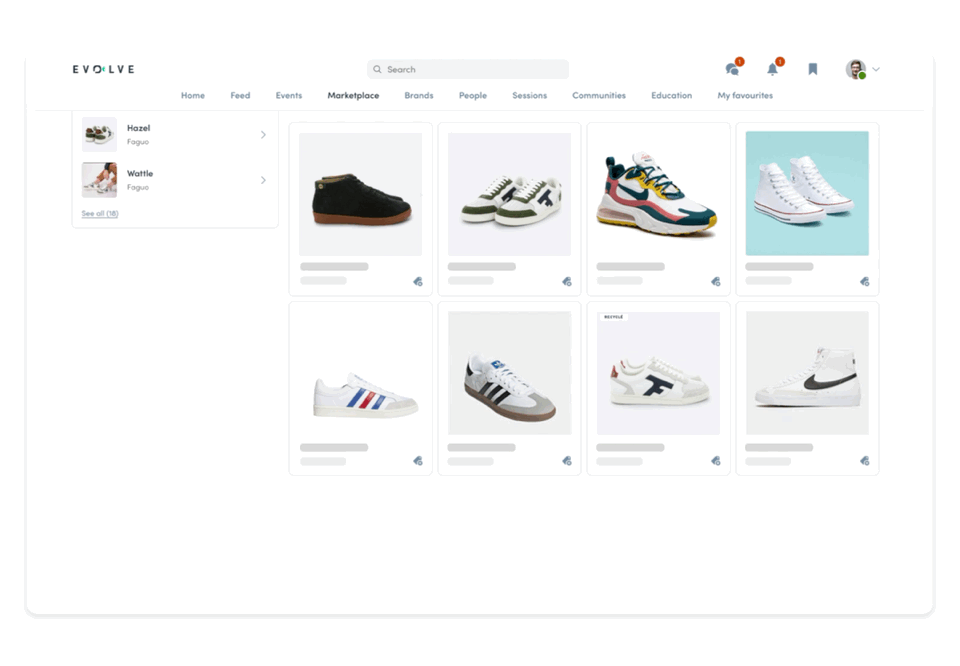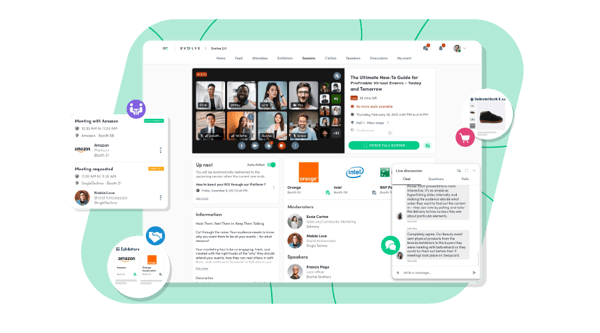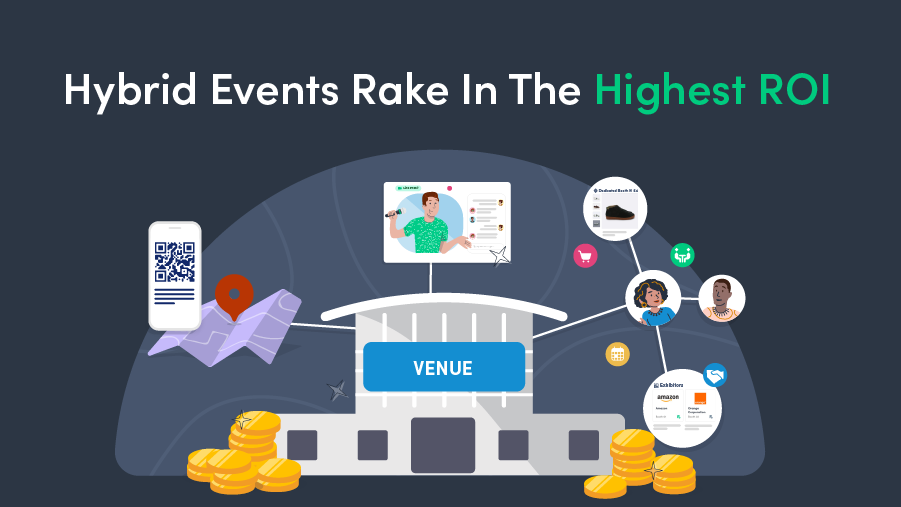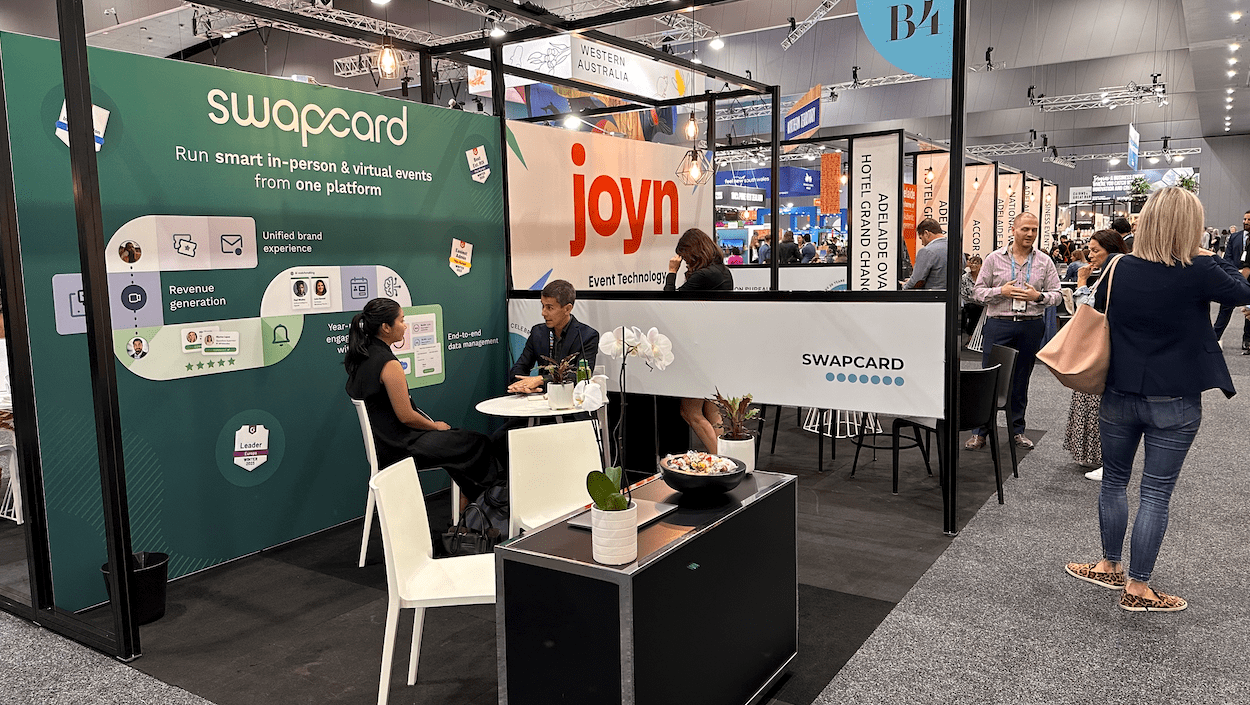Hybrid events are the best of both worlds. With a single event, you get to create an immersive and unconventional event experience for two different audiences, one virtual and one onsite.
You might be thinking that planning “two whole events” is time-consuming and expensive. And, quite frankly, it’s true. But once you see the pay-off for creating these one-of-a-kind event experiences, often generating more leads and better data, you won’t think twice about your budget. There’s a more valuable sales pipeline, too— meaning you get the best bang for your buck in ROI.
The Ups & Downs Of Hybrid Events
Sure, this new hybrid model has a lot of event planners in a spin. But with the challenges comes a lot of added value.
Cons
- It’s a ton of work
 Here’s the truth of the matter - hybrid events aren’t your run-of-the-mill kind of event. You’d be in a lot of trouble if you think you can just repurpose in-person content for your virtual attendees. Why? Because not all content translates well for an online audience.
Here’s the truth of the matter - hybrid events aren’t your run-of-the-mill kind of event. You’d be in a lot of trouble if you think you can just repurpose in-person content for your virtual attendees. Why? Because not all content translates well for an online audience.
Think about it - if you’re simply putting a camera in front of a magical, entertaining concert with a live audience, that isn’t giving your virtual audience a very special event experience. They can rewatch concerts anytime on streaming services. It’s going to take a lot more creative and outside-the-box thinking to make your hybrid event a success.
From re-imagining the attendee experience to choosing the right hybrid event platform and then learning about and using all the features properly, there’s a lot of work that needs to be done to make sure you get it right.
- Cost-intensive

There are a lot more logistical and technological challenges involved in pulling off a successful hybrid event than going solely virtual or 100% in-person. This means that you’re likely going to have to beef up your event budget.
Whether you’re hiring an in-house team or bringing on an external agency or production firm that specializes in hybrid events, it’s going to cost you. You’re also going to have to invest in an event platform that will work as a “virtual venue” for your at-home audience. Onsite production, venue costs, insurance, speakers and a virtual event platform all make the budget add up.
Keep in mind that this increased spending makes a lot of sense because you’re essentially running two kinds of events - one in-person and one digital. Also, take the time to find an event platform that is primed for hybrid events, such as Swapcard. An all-in-one event platform is an investment, but it will end up saving you money (and headaches!) in the long run.
Here’s Why Hybrid Works
The possibilities are endless
Are hybrid events complex? Sure. But one of the perks lies in how there are no limits to your creativity. You can tap into a bottomless well of innovation that will benefit both your in-person and virtual audience. It’s a playground of sorts for event professionals to push the frontiers of their creativity and serve up immersive and memorable experiences. If you’re looking for creative inspiration, we’ve got a post about it here.
Data is the new gold!
It's no secret that data helps provide insight into your audience’s behavior and receive feedback that you can’t get anywhere else. With virtual and hybrid events, the event industry finally has access to data that they’ve always wanted but could never get. Technology used in the event platforms helps event planners collect, track and analyze demographic and behavioral data from their community like never before. And this translates into cold, hard cash.
Data can help event organizers and sponsors alike learn about which material worked best, how people interact with different types of content, including sponsored content. This data provides valuable insights that can help improve investment and spending decisions. If you’re interested in seeing exactly how data can help you close business, check out our report here.
Bigger. Brand. Reach.

One of the best parts about running a hybrid event is the fact that you’ve got access to two audiences now instead of just one. That means attendees who would’ve otherwise struggled to get time off, board an aircraft, or travel across an ocean, are now available!
Think of it as a chain reaction that opens up the floodgates to profitability. Your sponsors, now realizing they have access to double the audience, will gain massive visibility. This opportunity to increase their brand reach will be hard to turn down as it gives them access to markets they perhaps didn’t previously have access to.
Next step: Monetize
-
Convincing your sponsors
Take that event data you now have at your fingertips and put it to work! Provide potential sponsors with info you’ve gathered from your previous virtual event that will show them exactly what opportunities they have in store and what they’re getting in return. In case you’re looking for more inspiration, we’ve also got a dedicated blog post on attracting exhibitors and sponsors to hybrid events.
-
VIP Tickets
 Similar to how concert and plane tickets work, you can also monetize exclusive access you’d be granting VIP attendees. This can include VIP sessions, exclusive content, Q&A with keynote speakers, swag bags and other enticing perks. Get creative with it!
Similar to how concert and plane tickets work, you can also monetize exclusive access you’d be granting VIP attendees. This can include VIP sessions, exclusive content, Q&A with keynote speakers, swag bags and other enticing perks. Get creative with it!
-
Booth Spaces
 Running ads for booth space is another sure-fire way to generate money. By providing booth spaces for organizations that share a similar target audience to yours, sponsors get to sell their products and services to their ideal audience online and onsite. Their reach has grown exponentially and they’re willing to pay to market!
Running ads for booth space is another sure-fire way to generate money. By providing booth spaces for organizations that share a similar target audience to yours, sponsors get to sell their products and services to their ideal audience online and onsite. Their reach has grown exponentially and they’re willing to pay to market!
-
Sponsor Banner Ads

When it comes to the best strategic location to place your sponsored banner ads, the events schedule is your best bet. Everyone needs to take a look at the schedule, which is why it’s a prime spot for sponsored ads. Another upside to sponsored banner ads at virtual events is that you’re able to include measurable data such as click-through rates and ad views to give sponsors a clear view of their investment.
-
MERCH(andise)

Swag bags and sponsored merch are a great way to increase a sponsor’s brand visibility. Not only is it a fun memento from your event, but it’s a great way for attendees to discover a sponsor’s brand. Sending practical items such as a notebook, a mug, or a t-shirt will allow sponsors to increase their brand recognition by reminding attendees about their company with each use.
-
Sponsor Widgets (For the Virtual Portion)
 This idea is for the virtual part of your hybrid event - sponsor widgets! They’re a fun and attention-grabbing way to boost visibility with the virtual audience in mind. They also serve as an easy point of access for interested participants to quickly be redirected to business profiles, exhibitor marketplaces, or virtual booths.
This idea is for the virtual part of your hybrid event - sponsor widgets! They’re a fun and attention-grabbing way to boost visibility with the virtual audience in mind. They also serve as an easy point of access for interested participants to quickly be redirected to business profiles, exhibitor marketplaces, or virtual booths.
Your Ticket Pricing Strategy
Figuring out how to properly price tickets for your hybrid event might feel like uncharted territory. That’s because for most planners, it is! That said, it’s key to remember that you’ve got two attendee experiences to keep in mind when deciding on pricing, meaning there is no “one size fits all” approach. With that said, let’s dive into some points to keep in mind for ticket pricing:
-
Pricing based on content access

This one is pretty simple: the more content and networking opportunities your attendee wants access to, the higher their ticket price. Your attendee ticket fee should reflect the amount and type of content they are entitled to. For your virtual attendees, this can range from simple live streaming to full-access to on-demand sessions & a 365-day community. For in-person attendees, you can include higher-priced tickets for those who want to have the option of watching sessions on-demand using the event’s virtual platform or would be interested in adding access to the online community as part of their ticket pricing.
-
Your digital event as a percentage of your in-person event

This is a more traditional pricing model and takes a lot of the guesswork out of your pricing process. Having the virtual portion of your event priced at a percentage of your live event is easier, especially if you only offer one type of virtual ticket.
You’ll first have to confirm how much your in-person event will cost before figuring out how the virtual portion should be priced. The rule of thumb for this pricing model is that your virtual aspect costs no more than 75% the total of your physical event. For example, if onsite is $100, then virtual would cost $75. This rule isn’t set in stone, but it is a helpful guideline.
Just remember, if your virtual ticket price is too affordable, you’re prone to losing onsite ticket sales because attendees are likely to opt for tickets that are significantly cheaper. If your price is too high, however, you run the risk of losing virtual attendees altogether. This strategy will take some experimentation.
-
Give them value, wherever they are

All in all, your ROI and bottom-line matter. When deciding on ticket pricing, always keep these two considerations in mind:
- The overall costs of running your hybrid event
- The type of access to the content your attendees will have and the perceived value of that content
Perceived value could be just as much of a deal-breaker as the actual value when you’re pricing your tickets. For instance, if attendees believe or have heard that the onsite experience far outshines the virtual experience, then they probably won’t have any interest in attending virtually. If, however, they find that the virtual component offers significant value because the content has been specially tailored for a virtual experience, that’s when you’re talking.
What to remember
Although hybrid events may present some challenges when it comes to expenses, budgeting, and logistic planning, they also offer the added benefits of brand visibility, creative immersive experiences, brand new avenues for monetization, and more!
Hybrid events aren’t perfect, but they’re worth the time and effort. They give attendees the choice to experience the event however they like, whether that’s in-person or virtually. However, your attendees choose to experience your hybrid event, don’t forget to take the time to price their tickets fairly and with value in mind.









